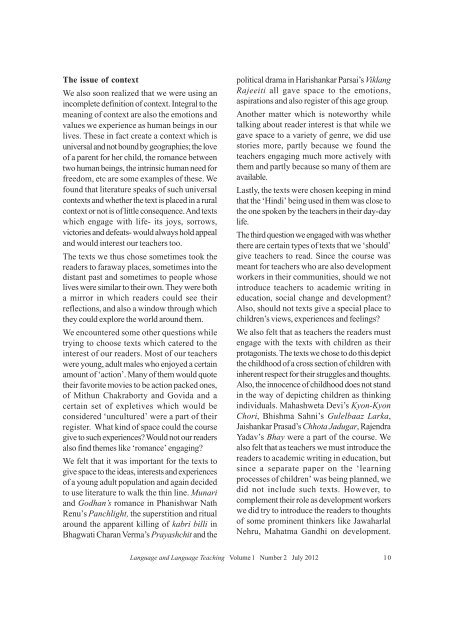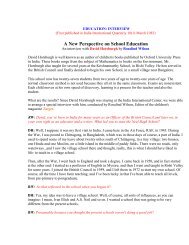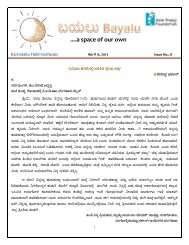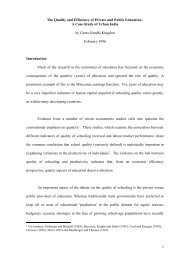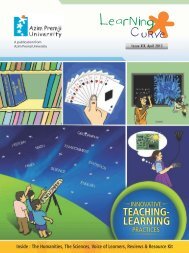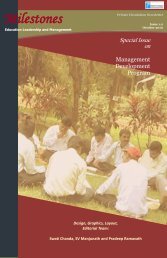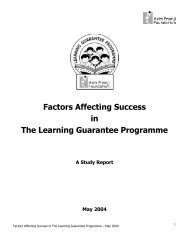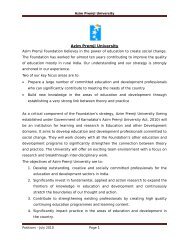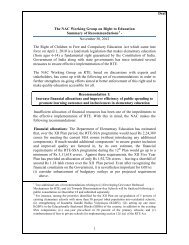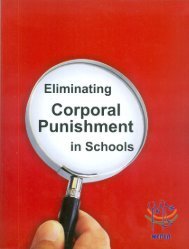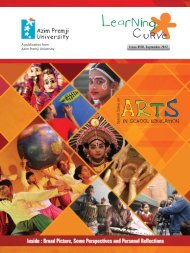Language and Language Teaching, Issue 2 - Azim Premji Foundation
Language and Language Teaching, Issue 2 - Azim Premji Foundation
Language and Language Teaching, Issue 2 - Azim Premji Foundation
You also want an ePaper? Increase the reach of your titles
YUMPU automatically turns print PDFs into web optimized ePapers that Google loves.
The issue of contextWe also soon realized that we were using anincomplete definition of context. Integral to themeaning of context are also the emotions <strong>and</strong>values we experience as human beings in ourlives. These in fact create a context which isuniversal <strong>and</strong> not bound by geographies; the loveof a parent for her child, the romance betweentwo human beings, the intrinsic human need forfreedom, etc are some examples of these. Wefound that literature speaks of such universalcontexts <strong>and</strong> whether the text is placed in a ruralcontext or not is of little consequence. And textswhich engage with life- its joys, sorrows,victories <strong>and</strong> defeats- would always hold appeal<strong>and</strong> would interest our teachers too.The texts we thus chose sometimes took thereaders to faraway places, sometimes into thedistant past <strong>and</strong> sometimes to people whoselives were similar to their own. They were botha mirror in which readers could see theirreflections, <strong>and</strong> also a window through whichthey could explore the world around them.We encountered some other questions whiletrying to choose texts which catered to theinterest of our readers. Most of our teacherswere young, adult males who enjoyed a certainamount of ‘action’. Many of them would quotetheir favorite movies to be action packed ones,of Mithun Chakraborty <strong>and</strong> Govida <strong>and</strong> acertain set of expletives which would beconsidered ‘uncultured’ were a part of theirregister. What kind of space could the coursegive to such experiences? Would not our readersalso find themes like ‘romance’ engaging?We felt that it was important for the texts togive space to the ideas, interests <strong>and</strong> experiencesof a young adult population <strong>and</strong> again decidedto use literature to walk the thin line. Munari<strong>and</strong> Godhan’s romance in Phanishwar NathRenu’s Panchlight, the superstition <strong>and</strong> ritualaround the apparent killing of kabri billi inBhagwati Charan Verma’s Prayashchit <strong>and</strong> thepolitical drama in Harishankar Parsai’s ViklangRajeeiti all gave space to the emotions,aspirations <strong>and</strong> also register of this age group.Another matter which is noteworthy whiletalking about reader interest is that while wegave space to a variety of genre, we did usestories more, partly because we found theteachers engaging much more actively withthem <strong>and</strong> partly because so many of them areavailable.Lastly, the texts were chosen keeping in mindthat the ‘Hindi’ being used in them was close tothe one spoken by the teachers in their day-daylife.The third question we engaged with was whetherthere are certain types of texts that we ‘should’give teachers to read. Since the course wasmeant for teachers who are also developmentworkers in their communities, should we notintroduce teachers to academic writing ineducation, social change <strong>and</strong> development?Also, should not texts give a special place tochildren’s views, experiences <strong>and</strong> feelings?We also felt that as teachers the readers mustengage with the texts with children as theirprotagonists. The texts we chose to do this depictthe childhood of a cross section of children withinherent respect for their struggles <strong>and</strong> thoughts.Also, the innocence of childhood does not st<strong>and</strong>in the way of depicting children as thinkingindividuals. Mahashweta Devi’s Kyon-KyonChori, Bhishma Sahni’s Gulelbaaz Larka,Jaishankar Prasad’s Chhota Jadugar, RajendraYadav’s Bhay were a part of the course. Wealso felt that as teachers we must introduce thereaders to academic writing in education, butsince a separate paper on the ‘learningprocesses of children’ was being planned, wedid not include such texts. However, tocomplement their role as development workerswe did try to introduce the readers to thoughtsof some prominent thinkers like JawaharlalNehru, Mahatma G<strong>and</strong>hi on development.<strong>Language</strong> <strong>and</strong> <strong>Language</strong> <strong>Teaching</strong> Volume 1 Number 2 July 2012 10


